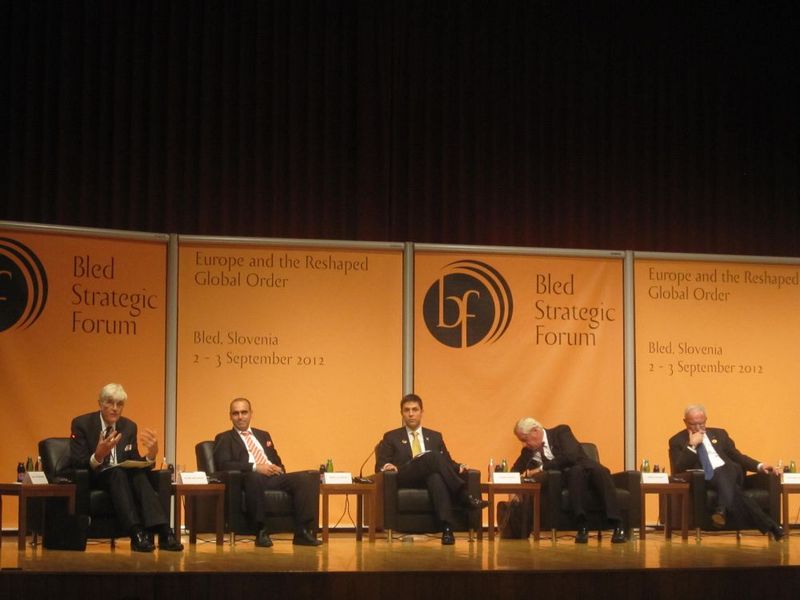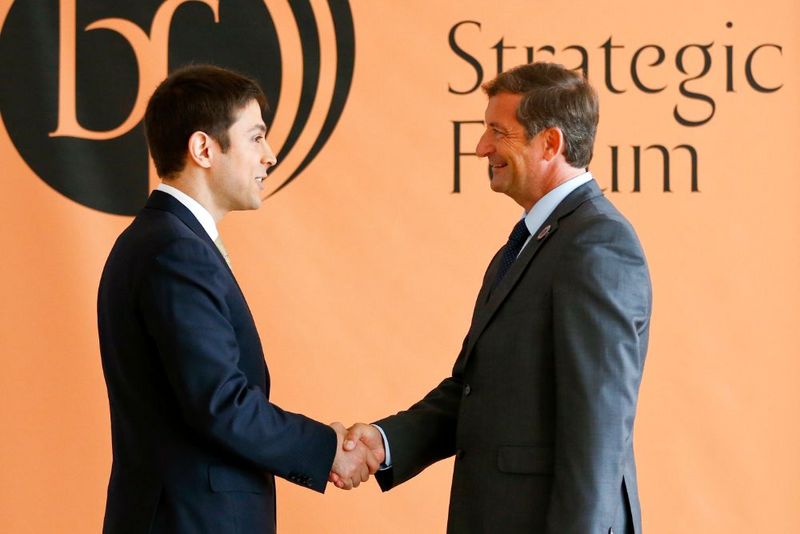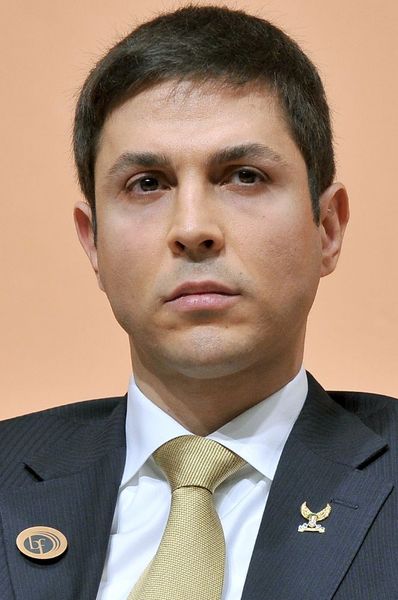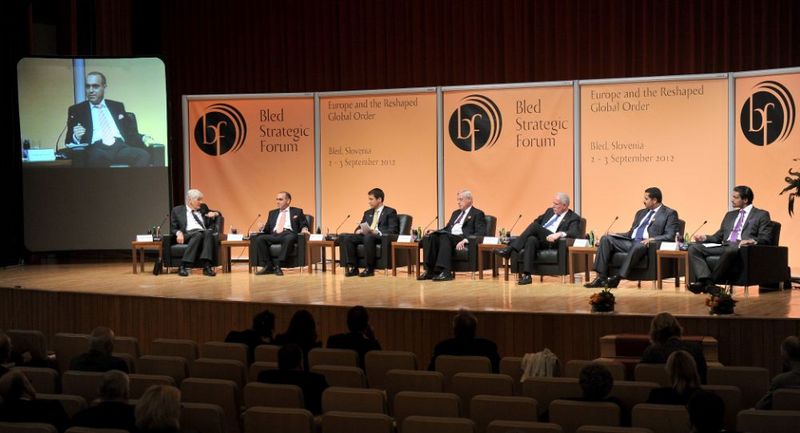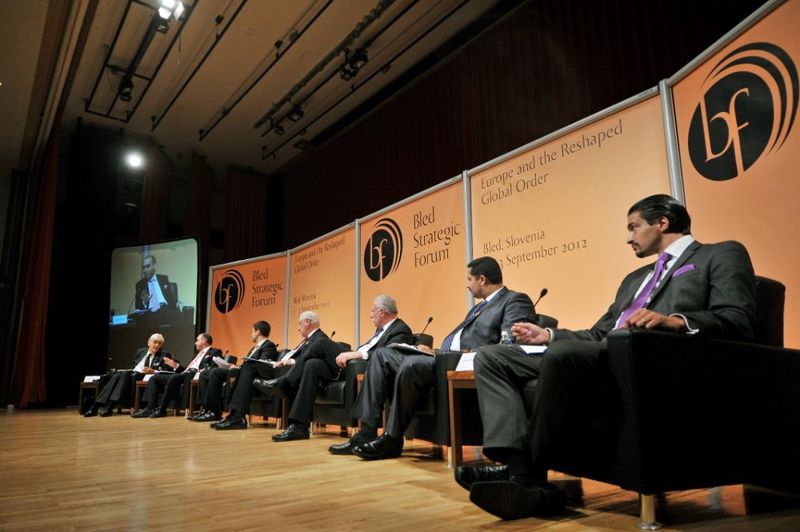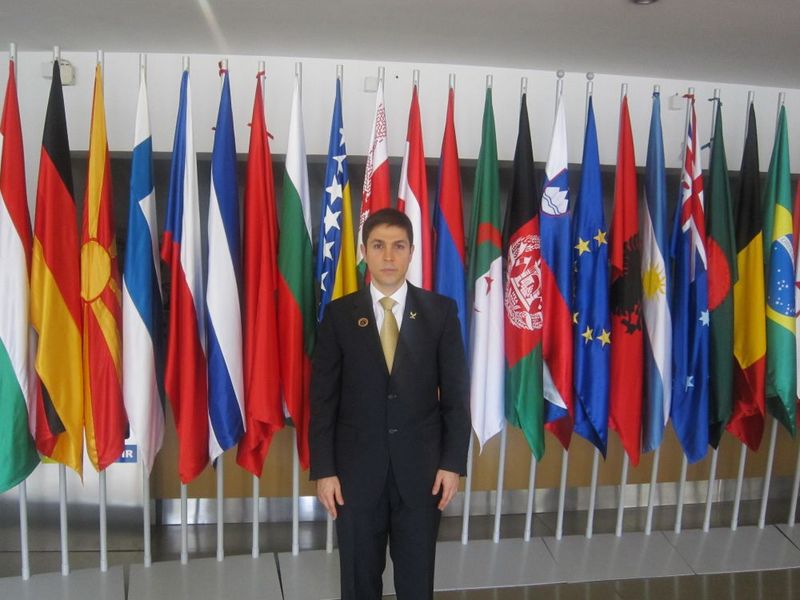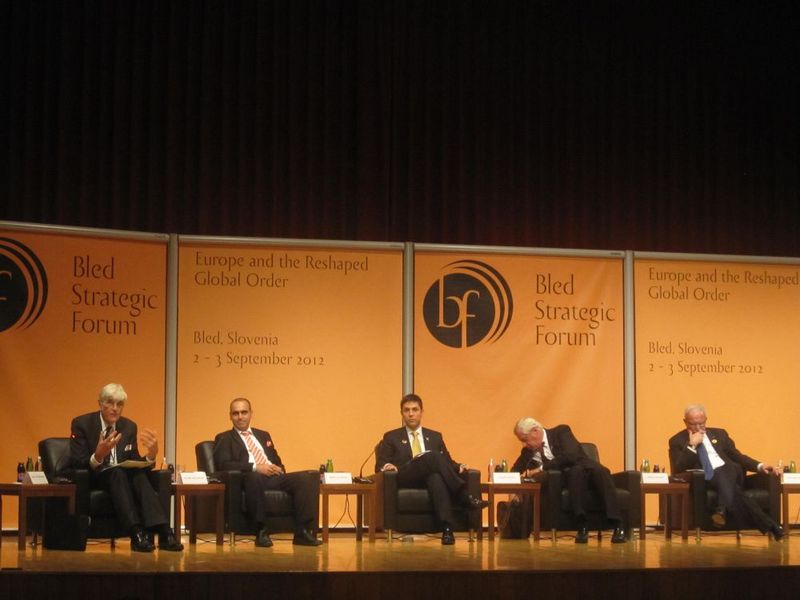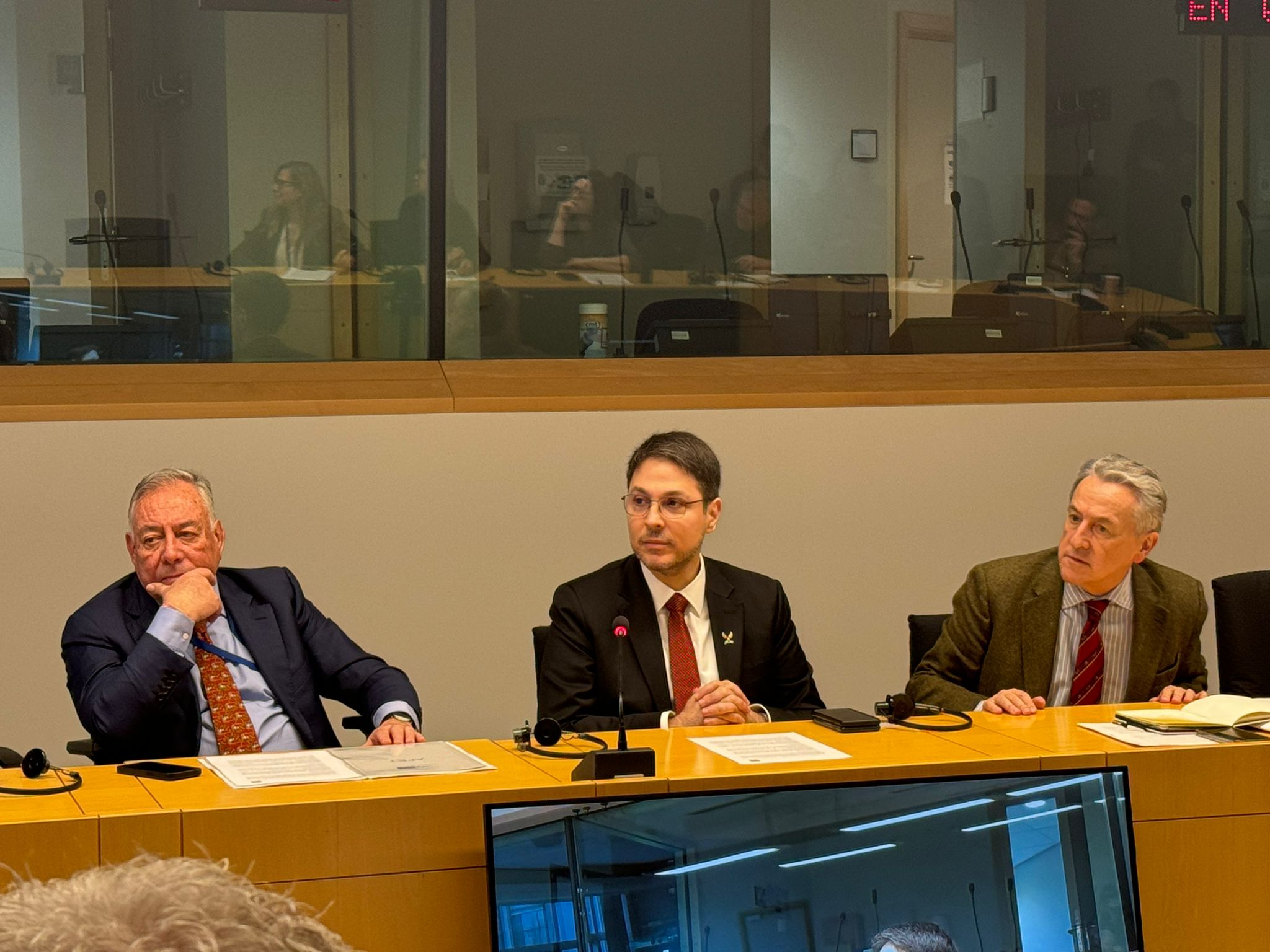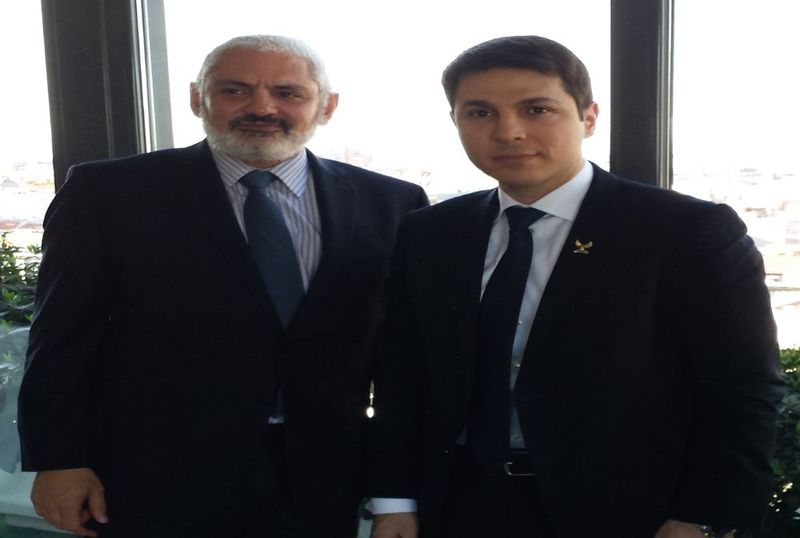Ribal Al-Assad, Director of the ODFS, this week spoke about Syria and the Arab Spring on a panel at the world distinguished Bled Strategic Forum in Bled, Slovenia. He was received at the event by H.E. Mr Karl Erjavec, Deputy Prime Minister and Minister of Foreign Affairs of the Republic of Slovenia
The Forum was attended by distinguished guests from across the world including Prime Ministers, Foreign ministers, diplomats and business leaders including:
H. E. Dr Danilo Türk, President of the Republic of Slovenia
H. E. Prof Dr Sali Berisha, Prime Minister of the Republic of Albania
H. E. Mr Hashim Thaci, Prime Minister of the Republic of Kosovo
H. E. Mr Miroslav Lajčák, Deputy Prime Minister and Minister of Foreign Affairs of the Slovak Republic
H. E. Mr Nebojša Kaluđerović, Minister of Foreign Affairs and European Integration of Montenegro
H. E. Mr Nikola Poposki, Minister of Foreign Affairs of the Republic of Macedonia
H. E. Prof Dr Vesna Pusić, Minister of Foreign and European Affairs of the Republic of Croatia
H. E. Mr Enver Hoxhaj, Minister of Foreign Affairs of the Republic of Kosovo
Mr Angel Gurría, Secretary-General of the Organisation for Economic Co-operation and Development (OECD)
Mr Eric S. Rubin, Deputy Assistant Secretary of State for European and Eurasian Affairs, United States of America
Ambassador Satinder K. Lambah, Special Envoy at the Office of the Prime Minsiter of the Republic of India
Ambassador Stephen Evans, NATO Assistant Secretary General for Operations
Ms Ana Trišič Babić, Deputy Minister of Foreign Affairs of Bosnia and Herezgovina
Mr Tornike Gordadze, State Minister for European and Euro-Atlantic Integration of Georgia
Prof Viola Adaku Onwuliri, Minister of State for Foreign Affairs of the Federal Republic of Nigeria
The panel was titled ‘Europe and the Arab Revolutions’.
It was moderated by Mr Edward Mortimer, Senior Programme Adviser at the Salzburg Global Seminar and Former Chief Speechwriter and Director of Communications to the UN Secretary-General Kofi Annan, United Kingdom
The panelists were:
H. E. Dr Riad Al-Malki, Minister of Foreign Affairs of the Palestinian National Authority
Mr Touhami Abdouli, State Secretary at the Ministry of Foreign Affairs of the Republic of Tunisia
H.E. Mr Pierre Vimont, Executive Secretary General of the European External Action Service
Mr Wadie Abunassar, Director of the International Center for Consultations,
Mr Ribal Al-Assad, Founder and Director of the Organisation for Democracy and Freedom in Syria based in the United Kingdom
Mr Mark C. Donfried, Director and Founder of the Institute for Cultural Diplomacy,
The Bled Strategic Forum is intended to promote a high-level strategic dialogue between leaders from the private and public sectors on the key issues facing Europe and the 21st century world. It has taken place annually since 2006 in the Slovenian resort town of Bled, world-renown for its beautiful alpine lake. The aim of the Forum is to generate new strategies capable of allowing Europe to better use its strategic space and leverage, and also to attract political commitments to these strategies. In addition, the forum offers a platform for cooperation between the private and public sectors aimed at developing common integrated approaches to resolving outstanding challenges and tackling new ones.
Ribal Al-Assad made the following Speech:
“Good evening.
It is an honour to be speaking to you all …
… at a Forum whose ethos is fundamentally democratic. Freedom and democracy in Syria and the Middle East are not just my subject but the focus of my life and work.
As a Syrian, living in exile since the age of nine, it saddens me to watch Syria plummeting into a state of civil war. I remain passionate about my home, its people and their traditional values of cross-cultural and religious understanding.
It is easy to forget that the opposition to the incumbent regime began peacefully as part of the much-heralded ‘Arab Spring’. The slide into violence and retribution was started by the response of a brutal incumbent regime with weak leadership. It has
escalated because the opposition has been divided and influenced by a convergence of external factors.
The complexity of these factors has made it easy for the outside world to label this as a war between ‘evil’ and ‘good’. This analysis is not only over-simplified, but misleading.
The regime is tyrannical and barbaric, but the opposition has been divided from the start, and has been hijacked by terrorists, extremists and geo-political interests. Which is why all efforts to create a peaceful, democratic solution have failed.
In essence, there are three tiers of conflict in and around Syria: the local, the regional and the global. All three are interwoven, but it is vital to understand how they have combined to create the current maelstrom of violence.
At the very highest level, there has been a growing escalation of tension between Russia and China against the US and NATO.
Dmitry Medvedev has repeatedly warned that time was running out for the West to secure Russia’s agreement to a missile defence shield in Europe. As President he warned in May about the dangers of military intervention in Syria or Iran.
He said:
… “At some point such actions which undermine state sovereignty may lead to a full-scale nuclear regional war.
The Middle East remains a flashpoint for Cold War enmity, and with Syria in flux,
It is reported Russian and Chinese ships now patrol the waters of the Eastern Mediterranean, close to military vessels from the United States, the United Kingdom, France and Germany.
Since the start of the uprising Russia has supplied Syria with arms including surface to air missiles and surface to sea missiles, and 3 million gas masks.Russia’s alliance with China has manifested itself in combined naval activities in the
South China Sea and three vetoes of UN Resolutions on Syria.
Beijing, meanwhile, has reacted to what it perceives to be a US policy of military and economic encirclement.
Recently the US and its allies conducted military exercises in Jordan to enhance their abilities to meet “security challenges”.
On a regional level, a growing schism can be observed throughout the Muslim world. The fault-lines are drawn on Sectarian grounds, with an Iranian-led Shia axis forming through Baghdad, Beirut and Damascus, backed by Russia and China for a number of strategic and economic reasons. They are facing-up to a Turkish-led
Sunni axis encompassing Saudi Arabia and Qatar and backed, implicitly at least, by the US and NATO.
The growing enmity between Turkey and Iran has also been fuelled by economic, strategic and political factors as they compete for regional hegemony.
As a result of all this, a ‘proxy’ war is already being fought in the country and has been for some time.
Unfortunately, as with so many complex issues around the world, it is easy for the press – and even some politicians with an ear for a sound-bite – to portray this as a fight between good and evil: The altruistic freedom fighters trying to save innocent
people in their opposition to a sadistic dictator murdering his own people.
Life is rarely that simple, particularly in the midst of this cauldron of diplomatic and religious tension. And misinterpretation stems from a simple, age-old misguided premise: that my enemy’s enemy is my friend. In the case of Syria, that means supporting anyone who purports to oppose the regime, irrespective of their motive.
In practise, the Syrian opposition has never been unified. For a time, they were purportedly represented internationally by the Syrian National Council (SNC), which is now recognised as a façade for the Muslim Brotherhood as stated by former member Kamal al-Labwani.
The SNC is divisive and divided. It has never been an inclusive opposition. It could not have been further from being democratic.
The latest person to resign from the SNC is Bosma Kodmani who was one of the few women in the SNC and head of its foreign affairs bureau
…this week she said that the SNC has effectively failed and should be replaced by a new political authority.
…I absolutely agree with her.
But there is irrefutable evidence that Saudis and Qataris are investing petro dollars to provide some of the opposition with arms. It is far from a homogenous opposition, fighting on behalf of the Syrian people, more a collection of groups, including militant and brutal fundamentalists.
The evidence now clearly shows what I have been saying for over a year – that there is al Qaeda infiltration and other terrorist groups have and are joining the armed opposition, including many foreign fighters.
These extremists continue to be called to action by Islamic clerics on Saudi-owned WISAL and SAFA satellite TV stations. .
From my perspective, much time is currently being wasted in making distinctions
between the influence in Syria of al-Qaeda, or non al-Qaeda affiliated Salafi Wahabi groups. They are all Islamist Jihadist groups, radicalising and militarising the conflict further. And the conflict will not end until this stops.
While it continues, innocent groups continue to suffer, as illustrated by the exodus of Christians taking place in certain parts of Syria. This situation is made worse by the statements of people such as the Grand Mufti of Saudi Arabia who called for “all churches across the region to be destroyed”
Syria is now exporting issues too. The conflict is spreading .Violence from the Syrian conflict has spilled over into Lebanon and Turkey.
The tragic failure of the Kofi Annan plan requires little further explanation.The Plan was undermined by the parties and States involved not acting in good faith.
One week after the International Community agreed on the Plan, Qatar and Saudi Arabia decided at the ‘Friends of Syria’ meeting in Turkey to fund the FSA, and called for weapons to be given to the opposition, which has led to a disastrous intensification of the conflict. I was entirely in agreement with the plan.
All of which makes the behaviour of the US, Britain and much of Europe hard to interpret. At best it is misguided. At worst it is hypocritical.
A shaft of light has been forthcoming in Secretary Clinton’s recent statement that the US was warning countries not to send Jihadists to Syria. But those good words fly in the face of her turning a blind eye to Saudi and Qatar doing just that.
More recently, the US media has reported President Obama as signing a covert order authorising the CIA to support the Syrian rebels.
The opposition is now receiving portable Stinger surface-to-air missiles. We can only guess where this will end.
William Hague has asserted that Britain has sent £5m for ‘non lethal’ aid. If this was all directed towards medicine, then peace might have a chance, but when it funds body armour and communications equipment then a fine line is being trodden; particularly when they can be used in conjunction with the lethal aid from Saudi and Qatar.
Peace is currently a distant dream, but not a dream that is being pursued by the majority of the international community.
Syria has become a pawn in a geo-political chess game. That game is turning ever more violent and sinister, with a regime willing to do anything to stay in power and an opposition being funded to fight them by international influences ramping up the aggression.
Syria has become a magnet for sectarian hatred and an all out civil-war leading to a regional war beckons.
But at some stage discussions will begin. It is vital that, irrespective of their diplomatic agendas, Western countries work solely in the interests of the Syrian people, including its minorities.
This means that arming of the opposition must be discouraged in the strongest terms. It means condemning states and extremist clerics advocating the murder of minorities.
It means ensuring that Syrian institutions stay intact and that the regime, the opposition and their outside backers are pressured into acting in good faith and supporting diplomacy.
Finally, and most urgently, it means enticing the Syrian opposition to finally come onto one platform and speak with one voice so an all inclusive peaceful democratic transition can take place.
An opposition is not worth supporting simply because of the regime it opposes. It must be encouraged to find a common purpose and unite. That presents Syria’s best and only hope for a peaceful future.
Thank you.”
